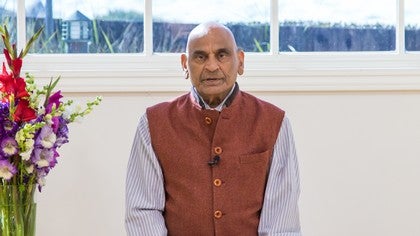Description
About This Video
Transcript
Read Full Transcript
Welcome. We're lucky enough to have Ravi Ravindra with us today. Ravi, whose new translation and commentary on the Bhagavad Gita will be coming out this spring, 2017, and he's agreed to come talk to us a little bit about it. Thank you for having me here. I'm happy to speak about it. So first off, Ravi, is what compelled you to do a translation and a commentary on a text that has been translated and commented on for a very long time? Well, I'm sure you know that every translation really is a transcreation because over the centuries the key words in any language, it's not only in Sanskrit. The same is true in English. If a great writer or a great sage says something about a key idea or a key word, a sort of a meaning is accreted around it. So it's not easy to always find one word in English that would be equivalent of one word in Sanskrit and also vice versa. As you can see, which is why particularly poetry is always much harder to translate than prose and the Bhagavad Gita is a poem. Literally it means the song of the blessed one. That's the meaning of the word, Bhagavad Gita. And so I was not satisfied with most translations and partly also in a way it is perhaps the most translated text from India. And I would even add that it is really the single most important text to originate from India. But precisely because of that there are many different ways to approach this. And there is a very strong streak in Indian spirituality is also to be found in other traditions of great asceticism withdrawing from the world as if the whole world is really maya or illusion. We can forget about this. Now I personally think this is only one streak of Indian spirituality. Most of us need to be involved in the world to be engaged with this. Why would Krishna who gradually reveals himself in the Bhagavad Gita as the incarnation of the highest divinity, why would he take trouble to be incarnated? He had no interest in the world. Similarly in the Christian tradition for example, God so loved the world that he gave his only begotten son. So even the very highest level of consciousness, we may call it God or ultimately Krishna or Brahma, they have some interest in this world. So this idea that this is all illusion, we can forget about it, make no appeal to me at all. This was so in a way I needed to make a translation but that's not really the only reason. Practically every major idea can be translated in varieties of ways. And so my interest really is how to engage in this world. We are responsible for our planet, we are responsible for our society. So Krishna has much to teach us about this. And so then why the battlefield and the analogy of the battle? And I think what can be confusing for so many students is yoga. Peace loving students. Peace preferring students. The word battle, the sense to the word is Yudha, which also means struggle. But really in a way one should also recognize that there is a constant struggle in everybody's life. To be sure, this is always the difficulty of any writer that once a major metaphor is chosen, that metaphor has its own logic. For example, if we have many texts of this kind in which the journey of the soul is taken as a climbing amount, then having a paddle is irrelevant. But it could also be that we could use the crossing the ocean as the journey of the soul. Then a pickaxe doesn't make any sense. So once we choose a major metaphor or any writer chooses it, then it has to correspond to the logic of that metaphor. So many weapons have to be described if the battlefield has been chosen. But what is really significant as far as I am aware, one should always have a certain humility about it because one doesn't know everything. But as far as I am aware, all the sages in India have interpreted the battle in the Bhagavad Gita as a struggle inside. Between our two different levels is one way of saying it, or our spiritual nature and our carnal nature or animal nature, if you like, on the other side. So sure, once the whole overall metaphor of battle is chosen, then in the very first chapter in the Bhagavad Gita, there is some slight, not very great detail really, but some description of certain kinds of weapons or certain kind of bugles which are being used. So I don't think the word battle is really to be meant literally killing somebody outside, because great emphasis at least twice in the Bhagavad Gita itself.
Krishna says even though the battle metaphor is used, he has to even fight and maybe even to kill people, but do this without violence. Hence is the Sanskrit word for it. So struggle would be almost a better way of translating it for most of our purposes. And so in this inner struggle with these layers of ourself that we are wrestling with, what do you feel is our primary weapon for success in this conflict of dharma? Actually, in fact, this is very directly relevant to the Bhagavad Gita itself. It's much to my surprise, I don't see most commentators or translators emphasizing the fact that the main yoga which is taught by Krishna is buddhi yoga, which will be, one could translate this as the yoga of awareness, yoga of integrated intelligence, even yoga of attention. Awareness I think is a more comprehensive word. So that is the main weapon, if you like. But I think again a little bit to emphasize, partly because slightly returning to your previous question about the battle, Krishna's whole teaching why this Bhagavad Gita becomes a classical text of yoga is precisely that Arjuna is not sure that he should be fighting with these very people, some of whom are his teachers or his uncles or cousins or nephews or grandfather in one case. And there Krishna is very much this emphasis that unless the actor is right, the action cannot be right. So the confusion that Arjuna has about dharma is the word which is used, dharma is interested in what is the right action. So it has many translations, responsibility, duty, obligation, what is my duty under these circumstances. But it depends now, there can be different circumstances for the same person and therefore there can be different responsibilities, some of them in conflict with each other. So Krishna's response very seriously is that dharma is concerned with doing the right action and there can be conflict of dharma, but if the actor is right, then whatever the actor does is right. So yoga is to make the actor right. This is why yoga is taught by Krishna and then varieties of yogas. So buddhi yoga is really the yoga of awareness of which then there are several, if you like, components, just as in an orchestra. The conductor may sometimes invite flutes, sometimes drums, sometimes chords or strings. So similarly then we have yoga of action, yoga of knowledge, yoga of love, yoga of meditation. Also the Bhagavad Gita is really a much more comprehensive text of yoga than any other. So that if the actor can be right, then whatever action it does will be right.
The Bhagavad Gita offers us a lot of different definitions of yoga and a yogi. One of the ones that I've found the spiciest lately is that yoga is the breaking of the bonds with suffering. Yes, yes, I actually emphasize this very much. This is just for some of the listeners. This is in the sixth chapter. Shloka specifically, Shloka 23rd, explicitly says, yoga, dukas sanyog vyog. Yoga is breaking the bond with suffering. And partly I think this is my understanding. Suffering keeps us more tied to our past than suffering. One can easily see this in one's own life. I occasionally joke about this. If somebody admires me, you know, I'm obviously pleased and happy but half an hour later I don't know who this person was. But if somebody humiliates me, that stays much longer. In fact, if we actually realize that the whole field of psychotherapy and psychiatry exists because we are stuck with our suffering. And that suffering may take place at the age of six or seven or eight. Some kid is assaulted but it would still stay 30 years later, 40 years later. So suffering is actually the more keeps us tied to our past and therefore leads to reaction always. Because I am now, as you are, everybody is, the end product of all our past, even the species past, cultural past, religious past. If I am male rather than female, that conditions me. If I am coming from a poor family or a rich family, that conditions me. So I am conditioned by all of my entire past. And that then leads me to react. Buddha Yoga, which is really again I keep translating, it is useful to keep coming back to this. Yoga of awareness. And if I become aware of this, then I can act otherwise rather than simply react. Then I can actually respond to the situation. So in fact I would even say, although Krishna doesn't specifically use these expressions, but if he were here he would agree with me. That's my general impression. I feel very friendly with Krishna. And that really, purpose of yoga actually could be defined as moving from reaction to response. But that requires Buddha Yoga, awareness. And so can you help our yogi friends? Because right now, particularly in America, there is a sense of needing to stand up and fight. And yet it doesn't feel like the right action because there is a desire to be more in response. There is a desire to not be in reaction. And so how does one stand up and fight when one maybe isn't a natural born warrior? Yes. No, actually the Bhagavad Gita would be absolutely the classical text for precisely these kinds of questions. First of all, very strong suggestion. In fact, this is almost the very first thing. Don't give in to inaction. This is almost the first renunciation that Krishna asks for. So don't give in to inaction. One needs to act. He gives his own example.
I have nothing to gain, but I act ceaselessly. If I were to stop acting, all these worlds will perish. So Krishna has to act. So he's inviting us to act. That's one thing. Secondly, then there are many, many things which are said about the, this becomes the whole understanding of Karma Yoga, Yoga of action. One is to be engaged in whatever you now determine is the right action without getting so occupied with whether it will succeed or it will fail. Because Krishna goes on to say later on that there are many factors that enter into it, including what we may say good luck or bad luck or destiny. Krishna actually has a word called Daivam, which means the will of the devas, subtler energies. Devas are more or less like angels in the Bible. We have nine orders of angels in the Bible. Similarly, there are many levels of devas. Actually, the highest one is Ravi. My partner doesn't like me to say that, but it's there. Therefore, very strong suggestion that there are many factors that are involved in whether an act will succeed or won't succeed. So if I get so occupied with it, it actually then displaces my attention from the present moment to the future. And this is in fact part of the nature of the ordinary mind. It's either anywhere but here, any other time but now. It's always worrying about the past or thinking about the future. So this is a very strong suggestion from Krishna to act but without getting so occupied with whether it will succeed or fail. So actually he advises equanimity, whether it succeeds or fails. But even much more importantly, if one begins to understand that there are many, many factors involved, then one becomes increasingly an instrument of higher energies. In fact, this is actually practically a definition of, I'm more or less quoting from the Bhagavad Gita, that a yogi recognizes that all this is being done by the forces of nature and that I do nothing at all. Now that is really becoming an instrument of these great forces. Can you share from your personal experience your own feeling of when you know that you are truly, as much as possible, being an instrument in response, in alignment with your Dharma? What does it feel like? I think even, for example, trying to do the translation of the Bhagavad Gita, and in fact even more so earlier about the yoga sutras, part of me resists all this. Then one finds circumstances, especially about the yoga sutras, my partner just gathered some translation and then presented them to me saying, now please correct it. So now, in a certain way, if you like, almost against my own self-will which is being driven by laziness, by saying, oh my God, there are hundreds of translations of the Bhagavad Gita, who wants to do this again, who is going to read it. You see what I'm saying? I mean, there is a kind of, we say, about writer's block, but this arises from many factors, including who the hell cares what I say. One has that attitude because there are well-known writers who have translated these great Sanskrit scholars, but all those are resisting forces. And if and when one can more or less feel that I just need to do my part here. But what is very important, I also slightly want to return to your previous question about the battle. Krishna's very strong advice is, this is actually another definition of yoga, skillfulness in action. So, engage in this battle skillfully, but at the same time to remain above the battle. That is the tricky part. In fact, which is why the very last shloka in the Bhagavad Gita, which is by Sanjay, the person who is really describing it, describing the dialogue between Krishna and Arjuna, he says, only when there is Arjuna, the skillful warrior, and Krishna, the lord of yoga, then there is victory. So, Krishna is really representing, in a way, the level of the self, if you like, which is above the battle, but is aware of what is taking place. Arjuna there is representing the level, which is very much engaged in the battle skillfully. Arjuna was regarded as the most skillful warrior. Even his opponents, when they want to praise a warrior, they would say he is as great as Arjuna. So, even his opponents recognize his greatness. Actually, the government of India even now has an award called Arjuna Award in India. So, he is highly regarded. Nevertheless, he needs to have that level in himself, which is really represented by Krishna, which is above the battle. He doesn't even participate in the battle. Krishna does not take up any weapons in the battle. So, what I hear you saying maybe is that there has to be a willingness to essentially sacrifice our small self to be able to find victory. Sacrifice in the real sense of the word, meaning making it sacred, that is the origin of that word, sacrifice. It doesn't mean to get rid of it, but it needs to serve something subtler, higher. So, in this case, Arjuna is not killing himself or sacrificing in the ordinary sense of the word, but he sacrifices his self-will in order to serve the will of Krishna. For example, that is actually the great transformation of Arjuna that takes place. In the very first chapter, when he begins to say, actually it is said strongly in the very beginning of second chapter, but it begins in the first chapter, that dharma samur chethsa, my mind is bewildered about dharma. What is my responsibility in the light of my own teachers have to be fought or my uncles and cousins. And then he gives up. He will not fight even if they kill me. So, you see, he gives into inaction. This is why Krishna says, don't give into inaction to begin with. And then at the end, Arjuna says, I have remembered myself. That doesn't mean remembering anything historical, but he has gathered himself. And here I stand.
My confusion is ended and I will carry out your word. So, you see, that's the whole transformation. But that doesn't mean that he is forgetting his skillfulness in action. That's what he brings. But it is serving something much subtler. So, it's not sacrificing the world. Unfortunately, these days, the word sacrifices come to mean getting rid of something. But classically, it actually means to make something sacred. It comes from Latin words, sacre, fa care, to make something sacred. This is what makes his life sacred or his skill sacred. Yeah. So, when your book comes out, how can any advice on how to most effectively engage with the text to help us reduce our confusion? Yes. Well, first of all, this is my general advice, not only about this particular text or certainly my translation, but about anything that we read from the scriptures or any sages who somehow resonate in us. Not everything resonates in us. I'm sure, in the Bhagavad Gita also or in the Gospels, one reads many things. Certain expressions deeply resonate, even though we may not understand them in the ordinary rational way. But something speaks to us. But my suggestion is that any of these texts, we need to always ask, how does it apply to me? What is called from me here? And Krishna, in any case, explicitly says in the Bhagavad Gita, two things which should be emphasized. One is, dozens of times he says I am seated in the heart of everyone. So we don't need to think of God outside myself or Krishna outside myself, which is the reason why I said earlier that all the sages in India have interpreted this to be really a dialogue between our deepest self and our more or less usual self. Well, even the usual self is very skillful in the case of Arjuna. It's not quite ordinary self, but still. And secondly, repeatedly Krishna says that one needs to, this is actually mark of a great yogi or learner or a student questioning. So that would be my advice. Just because it is in the text or just because you like Ravi and Ravi has said that, no.
That could invite you to reconsider before you dismiss it. If Christ has said something or Buddha has said something and we don't understand it, it's wise for us not to dismiss it. Wise to reconsider it. But still ultimately, how does it apply to me and what is called from me? And questioning. Questioning is absolutely necessary. Thank you for being here today, Ravi G. And thank you. And we'll look forward to discussing this book together. Love.
The Heart of the Traditions
Comments
Sara
 I look forward to watching more interviews. Thank you!
I look forward to watching more interviews. Thank you!
You need to be a subscriber to post a comment.
Please Log In or Create an Account to start your free trial.


















